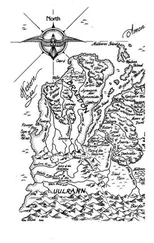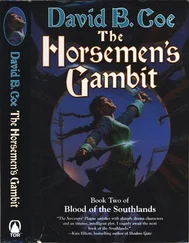‘Sort of …’ Rachel said, although there was no mistaking the note of uncertainty in her voice.
‘Well, I’ll put it as simply as I can,’ said Sir Gilbert. ‘I want you to turn my son into a normal person.’
Rachel would have considered this a bizarre request at the best of times. Here, disorientated after her long journey, she thought it stranger than ever, and for a moment she found herself wondering if she had somehow passed through a looking glass in the last twenty-four hours, and emerged into a parallel world where the everyday rules and assumptions had been inverted.
‘A normal person?’ she repeated.
‘Yes. I want him to be able to open his mouth without it sounding as though he thinks he owns the world and everything in it.’
Rachel took a deep breath. ‘OK then. I’ll … see what I can do about that.’
‘You have a very strong accent,’ said Sir Gilbert. ‘What is it, Lancashire?’
‘Yorkshire. You don’t want me to give him a Yorkshire accent, do you?’
‘No. I don’t really care what you do to him. Talk to him, read to him, whatever it takes. You can start tomorrow at nine. Spend the day with him and see what you can manage.’
With that, he picked up his iPad and began reading a magazine article. Rachel realized that this was his way of telling her the conversation was at an end.
*
The next morning, Lucas did not go on safari with the others. Nor did his father. Rachel imagined, at first, that Sir Gilbert wanted to stay behind to keep a watchful eye on their tutorial, but it turned out that this was not the case at all. He took no notice of them, and confined himself to his tent, where he busied himself with his iPad, a slim leather briefcase full of documents and a number of phone calls. (While mobile reception was non-existent for Rachel, Sir Gilbert had brought along what seemed to be some sort of military satellite phone — a chunky piece of kit complete with retractable aerial — and he spent a good deal of the morning talking on it.)
Rachel quite enjoyed her morning talking to Lucas. She had encountered a number of Etonians at Oxford, and although they came, of course, in very different forms, she knew that there was one thing they all had in common: a tremendous air of confidence. This confidence, she had always felt, was a wonderful asset: what a great feeling it must be, to know that your wealth and education would not just insulate you against some of the worst of the world’s hardships, but prepare you for a life in which your destiny, handed down as if by birthright, was to control the lives of others. But it was hardly surprising that this confidence, nurtured and encouraged by fierce parental ambition, could easily turn to unbearable arrogance, and this was no doubt what Sir Gilbert feared in his son’s case.
In fact, after a few hours’ conversation, she had the impression that Lucas was not so much arrogant as depressed. Maths was not his own choice of university subject, it seemed. His real passion was Classical Civilization, but ‘Mum vetoed that,’ he told her. ‘She says it’s a Mickey Mouse subject.’ Maths, it had been decided instead, would better prepare him for the job in the City for which his whole education had, up until this point, been a mere laying of the groundwork. Rachel decided that what he really needed was a training in interview technique: every question that she asked him, about art, about drama (another passion), about books, about politics, produced not a thoughtful or reflective answer, but some boastful comeback about the prize he had won for an essay, or the top marks he had been given for his coursework, or the speech he had made that had won a standing ovation, or the famous author whose children he’d been on holiday with. Every reflex in his brain seemed to be geared towards competition and one-upmanship. None of this, Rachel thought, was exactly his fault, and she only really lost patience with him once, when he told her that failing to get into Oxford would be a personal disaster because it would mean ‘I might end up at some Mickey Mouse university with a lot of chavs’. At which point she proposed that they break for lunch.
Shortly before noon — presumably having taken the same flight that had brought Rachel to Skukuza the day before — another guest arrived. He ate lunch with Lucas and Sir Gilbert, while Rachel was seemingly expected to eat by herself, at her own table on the decking of her own tent, but when the meal was over, the new arrival made a point of coming over to introduce himself.
‘Hello,’ he said, stretching out the word in what Rachel could only assume was intended to be a flirtatious manner. ‘And who have we here ?’
‘My name’s Rachel,’ she said. ‘I’m here to do some tutoring for Sir Gilbert and his family.’
‘Francis,’ said the man, returning the handshake. ‘Frederick Francis. My friends call me Freddie.’
He was in his mid-forties, Rachel would have guessed. Fit and well preserved. Slight traces of grey around the temples were really his only signs of middle age. He was not unattractive, by any means, but there was something about him, something indefinable, which made her immediately want to recoil.
‘You’re new, aren’t you?’ he said. ‘New to the family, I mean.’
‘Yes,’ said Rachel. ‘I arrived yesterday.’
‘Staying long?’
‘I’m not really sure,’ she replied, laughing. ‘That hasn’t been made clear.’
‘Ah, yes. Sir Gilbert likes to preserve the element of surprise.’
Not fully understanding this, and wanting to fill the void of silence that followed, Rachel asked: ‘So, have you been allocated your tent?’
‘Sadly, no,’ he answered. ‘I’m going back to London on this evening’s flight.’
‘Wow.’ Rachel was — not for the first time in the last two days — astonished. ‘That’s a long way to come, just for the afternoon.’
‘Well, Sir Gilbert won’t be in London again for a while, and I’ve got some things he needs to sign. They’re rather urgent.’
‘Ah. I see,’ said Rachel, although she very much didn’t. ‘You work for Sir Gilbert, then, do you?’
Freddie pretended, at least, to give this question serious thought. ‘Now that’s a tricky one. Do I work for him? Or do I work for myself? Or does he work for me?’
Rachel wasn’t interested in riddles right now. ‘What line of business are you in?’ she asked, directly.
‘Before I go,’ said Freddie, ‘I’ll give you my card.’
But he was either lying, or he forgot, and when he departed the camp that afternoon at 4.30, Mr Francis left her not with a business card but with a long, appraising look from the window of the Land Rover, and an inexplicably uneasy feeling in her gut.
*
As it happened, Rachel and the rest of the family were not long in following Mr Francis back to the airport in Johannesburg. That evening at six o’clock, Madiana and the twins arrived back from their latest safari, and Lady Gunn was more contemptuous of the guide’s endeavours than ever.
‘Gilbert, darling,’ she said, as the twins ran into the tent to change into their swimming costumes, ‘we are absolutely wasting our time here. There are no lions in this park, none at all. All we saw today were those stupid elephants again.’
‘I told you — I can provide you with most things. But not lions, I’m afraid.’
‘Then I seriously think we might as well pack up and go home.’
And the next day, that was exactly what they did. They packed up early in the morning: Madiana, Rachel and the children flew back to London, and Sir Gilbert took a plane to Singapore, although whether that was his final destination was anybody’s guess. Madiana did not seem to know or even particularly care where he was off to. This was one of the many things that puzzled Rachel, as she mulled over the trip during the eleven-hour flight home. She had much to think about on that flight: these last few days had been among the most mysterious of her life, after all. But amidst the dense tangle of her thoughts, the image that recurred to her most often, strangely enough, was a view of the camp itself: booked out for the rest of the week by Sir Gilbert and his family, but now defined, instead, by their absence: the swimming pool unused, the bar and restaurant deserted, the staff redundant, the very tents themselves standing empty and purposeless in the grey shade of the jackalberry trees.
Читать дальше












